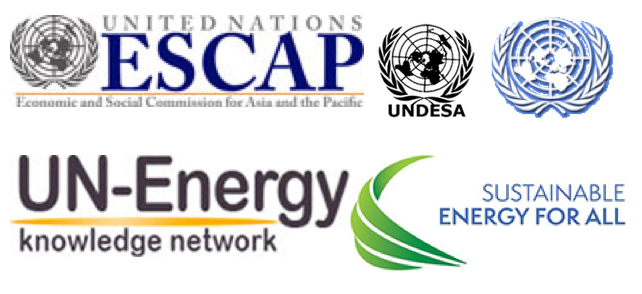The UN Economic and Social Commission for Asia and the Pacific (ESCAP), the UN Department of Economic and Social Affairs (DESA) and the UN Office for Sustainable Development (UNOSD), in cooperation with UN-Energy and the Sustainable Energy for All (SE4All) initiative, jointly organized a seminar on energy access, which discussed alternatives to the use of unsustainable solid biomass for cooking and heating.
The seminar promoted efforts toward achieving Sustainable Development Goal (SDG) 7, which aims to ensure access to affordable, reliable, sustainable and modern energy for all, in particular target 7.1 (By 2030, ensure universal access to affordable, reliable and modern energy services).
 23 June 2016: The UN Economic and Social Commission for Asia and the Pacific (ESCAP), the UN Department of Economic and Social Affairs (DESA) and the UN Office for Sustainable Development (UNOSD), in cooperation with UN-Energy and the Sustainable Energy for All (SE4All) initiative, jointly organized a seminar on energy access, which discussed alternatives to the use of unsustainable solid biomass for cooking and heating. The seminar promoted efforts towards achieving Sustainable Development Goal (SDG) 7, which aims to ensure access to affordable, reliable, sustainable and modern energy for all, in particular target 7.1 (By 2030, ensure universal access to affordable, reliable and modern energy services).
23 June 2016: The UN Economic and Social Commission for Asia and the Pacific (ESCAP), the UN Department of Economic and Social Affairs (DESA) and the UN Office for Sustainable Development (UNOSD), in cooperation with UN-Energy and the Sustainable Energy for All (SE4All) initiative, jointly organized a seminar on energy access, which discussed alternatives to the use of unsustainable solid biomass for cooking and heating. The seminar promoted efforts towards achieving Sustainable Development Goal (SDG) 7, which aims to ensure access to affordable, reliable, sustainable and modern energy for all, in particular target 7.1 (By 2030, ensure universal access to affordable, reliable and modern energy services).
The seminar took place at the UN Conference Centre in Bangkok, Thailand, from 21-23 June 2016. According to ESCAP, more than 1.1 billion people worldwide do not have access to electricity, and 2.9 billion people rely on biomass fuels, such as firewood and charcoal, for cooking and heating. A large proportion of these people reside in the Asia-Pacific region, which is home to 455 million people without access to electricity and 2.06 billion people that rely on solid fuels for their household needs.
In his opening remarks, Kaveh Zahedi, Deputy Executive Secretary, ESCAP, called for addressing energy access through technologies such as solar home systems, clean cook stoves and mini and micro grids, noting that these would result in multi-dimensional benefits in terms of income generation, education, gender equality, livelihoods and environmental sustainability.
Jong-Soo Yoon, UNOSD Director, highlighted the linkages between the issue of universal energy access and other factors contributing to sustainable development. Ivan Vera, UN Energy Secretary, UNDESA, said the UN is organizing a series of similar events focusing on the most critical issues affecting progress on the SDGs.
The seminar brought together representatives of governments, international organizations and sustainable energy experts to discuss sustainable energy options in the region and to share examples of good practice. Delegates heard presentations on: technologies that can provide access to affordable, reliable and modern energy services; enabling factors and policies; and adoption of a nexus approach that takes into account energy and health issues, and urbanization.
Recommendations from this seminar will be submitted to the High Level Political Forum (HLPF) taking place from 11-20 July 2016 in New York, US. [ESCAP Seminar Webpage] [ESCAP Seminar Opening Press Release]